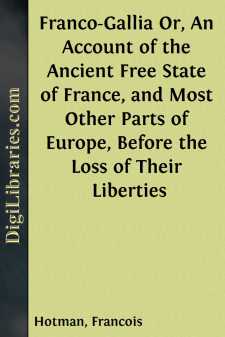Categories
- Antiques & Collectibles 13
- Architecture 36
- Art 48
- Bibles 22
- Biography & Autobiography 813
- Body, Mind & Spirit 142
- Business & Economics 28
- Children's Books 17
- Children's Fiction 14
- Computers 4
- Cooking 94
- Crafts & Hobbies 4
- Drama 346
- Education 46
- Family & Relationships 57
- Fiction 11829
- Games 19
- Gardening 17
- Health & Fitness 34
- History 1377
- House & Home 1
- Humor 147
- Juvenile Fiction 1873
- Juvenile Nonfiction 202
- Language Arts & Disciplines 88
- Law 16
- Literary Collections 686
- Literary Criticism 179
- Mathematics 13
- Medical 41
- Music 40
- Nature 179
- Non-Classifiable 1768
- Performing Arts 7
- Periodicals 1453
- Philosophy 64
- Photography 2
- Poetry 896
- Political Science 203
- Psychology 42
- Reference 154
- Religion 513
- Science 126
- Self-Help 84
- Social Science 81
- Sports & Recreation 34
- Study Aids 3
- Technology & Engineering 59
- Transportation 23
- Travel 463
- True Crime 29
Franco-Gallia Or, An Account of the Ancient Free State of France, and Most Other Parts of Europe, Before the Loss of Their Liberties
by: Francois Hotman
Categories:
Description:
Excerpt
The State of Gaul, before it was reduced into a Province by the Romans.
My Design being to give an Account of the Laws and Ordinances of our Francogallia, as far as it may tend to the Service of our Commonwealth, in its present Circumstances; I think it proper, in the first place, to set forth the State of Gaul, before it was reduced into the Form of a Province by the Romans: For what Cæsar, Polybius, Strabo, Ammianus, and other Writers have told us concerning the Origin, Antiquity and Valour of that People, the Nature and Situation of their Country, and their private Customs, is sufficiently known to all Men, tho' but indifferently learned.
We are therefore to understand, that the State of Gaul was such at that time, that neither was the whole under the Government of a single Person: Nor were the particular [Footnote: Civitas, a Commonwealth.] Commonwealths under the Dominion of the Populace, or the Nobles only; but all Gaul was so divided into Commonwealths, that the most Part were govern'd by the Advice of the Nobles; and these were called Free; the rest had Kings. But every one of them agreed in this Institute, that at a certain Time of the Year a publick Council of the whole Nation should be held; in which Council, whatever seem'd to relate to the whole Body of the Commonwealth was appointed and establish'd. Cornelius Tacitus, in his 3d Book, reckons Sixty-four Croitates; by which is meant (as Cæsar explains it) so many Regions or Districts; in each of which, not only the same Language, Manners and Laws, but also the same Magistrates were made use of. Such, in many Places of his History, he principally mentions the Cities of the Ædui, the Rhemi and Arverni to have been. And therefore Dumnorix the Æduan, when Cæsar sent to have him slain, began to resist, and to defend himself, and to implore the Assistance of his Fellow Citizens; often crying out, That he was a Freeman, and Member of a Free Commonwealth, lib. 5. cap. 3.
To the like purpose Strabo writes in his Fourth Book: [Footnote: ÐÐÐÑÐâ ριστοκρατικαÐÐÐРж δ' ÐÐÐÑЦσαν αÐÐÐÑб πλεÐÐÐÐους τÐÐÐÑжν πολιτειÐÐÐÑжν, ÐÐÐÑвÐÑνα δ' ÐÐÐÑÐÐγεμÐÐÐâνα ÐÐÐÑÐÐροÐÐÐÐντο κατ' ÐÐÐÑÐÑνιαυτÐÐÐâν τÐÐÐÐ ÐÑ παλαιÐÐÐÐ Ðâν ÐÐÐÐ ÐÐς δ' αÐÐÐРвÐÑτως εÐÐÐÑаς πÐÐÐâλεμον ÐÐÐÑÐÑÐÐÐÑзς ÐÐÐРвÐÂπÐÐÐÐ ÐÑ τοÐÐÐÑЦ πλÐÐЮθους ÐÐÐÑвâ¬πεδεÐÐÐÐκνυτο στρατηγÐÐÐâς.] "Most of the Commonwealths (says he) were govern'd by the Advice of the Nobles: but every Year they anciently chose a Magistrate; as also the People chose a General to manage their Wars." The like Cæsar, lib. 6. Cap. 4. writes in these Words: "Those Commonwealths which are esteem'd to be under the best Administration, have made a Law, that if any Man chance to hear a Rumour or Report abroad among the Bordering People, which concerned the Commonwealth, he ought to inform the Magistrates of it, and communicate it to no body else. The Magistrates conceal what they think proper, and acquaint the Multitude with the rest: For of Matters relating to the Community, it was not permitted to any Person to talk or discourse, but in Council."—Now concerning this Common Council of the whole Nation, we shall quote these few Passages out of Cæsar....


